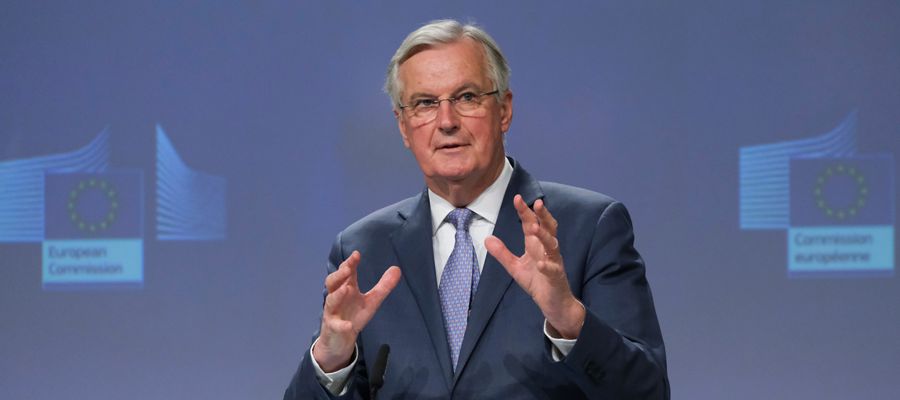The UK and EU are targeting Mid November to get a trade deal agreed.
- Tuesday, November 3, 2020
 UK negotiators have repeatedly expressed their frustration that so far, the EU has refused to start drafting joint legal text even though a large majority of the trade deal is already agreed in areas such as goods, transport and social security.
UK negotiators have repeatedly expressed their frustration that so far, the EU has refused to start drafting joint legal text even though a large majority of the trade deal is already agreed in areas such as goods, transport and social security.
As of early November, there is now growing expectations of a free trade agreement to be made between the UK and EU. The two sides moved into detailed legal text writing after Boris Johnson stood firm on his Withdrawal agreement deadlines after the European Council meeting on 15th October ended without progress and more rhetoric. As a result, the UK government called off any further trade discussions until the EU confirm that they want to agree a ‘Canada style’ free trade agreement. The stance taken at the European Council meeting is now seen by many leading EU figures as a mistake. It only made Boris Johnson more determined to force a deal out of the EU. The EU softened its position and Michel Barnier was sent back in London.
Mr. Barnier told the European Parliament that sovereignty is a legitimate concern for the UK and that the EU key principles of fair competition in future trading was compatible with British sovereignty.
The three issues that have held up the agreement have been fishing rights in UK waters, a level playing field over state aid and the resolution process for handling trade disputes.
As far as fishing rights are concerned the new and extended access to UK waters by the current UK fishing fleet is likely to take time to develop. During this period, it could make sense to sell access rights to other countries fleets. Fishing is a symbolic and political issue that defines sovereignty in the control over owes own waters rather than an economic one.
French President Emanuel Macron has previously demanded that French fishing boats have permanent access to UK fishing waters while other non-fishing nations have reminded him that a no Brexit deal means no fishing access. His recent comments are starting to look more realistic as he concedes that French fishing boats will not have the same access as before Brexit and that French fishermen could pay for continued access to UK waters. We expect that a deal can be done as already the UK has apparently offered a 3-year transition to an annually negotiated quotas to foreign fleets based upon stock levels, similar to the deal that the EU has with Norway over fishing currently.
The issue of a level playing field for state aid is one that ties the UK to the rules and regulations of the EU. The economic case for Brexit is one that breaks free from such rules and establish one’s own regulation that best suits your economy, quality and safety standards. The is the area of negotiations that most concerns German Chancellor Angela Merkel as the UK could use its new found freedoms to fully compete with mainland Europe in a way not previously pursued.
A zero-tariff free trade agreement would in essence be a continuation of the current status quo. Brussels will surely wish to curtail access to the EU single market to some degree as to that provided to the remaining EU member states. Membership must have some additional benefits.
The pressure on the UK to secure an agreement with the EU has increased when Barbara Wiesel, the former Assistant US trade representative said that a US\UK trade deal would be delayed by a Biden Administration until the UK relationship with the EU was decided. Joe Biden is sensitive to the US Irish sentiment and wants to ensure that the Good Friday Agreement is secured within a deal with Brussels. A zero-tariff free trade agreement would ensure that is done.
Ireland Foreign Minister Simon Coveney recently said that he expects a UK/EU deal to be concluded by mid-November. Mr Coveney suggested that even with a zero-tariff free trade agreement in place there would still be disruption to trade and transportation. The UK and EU are targeting Mid November to get the trade deal agreed and then ratified by EU leaders. The Westminster and European Parliaments would then have time to scrutinize and ratify the deal prior to the end of the transition period.
Due to the soaring levels of coronavirus infections in Brussels, there are concerns that Brexit negotiations may be delayed if any senior figures test positive and having to isolate. The talks are now focused on drafting legal text for the post Brexit trade deal and is considered too complex to be handled by way of video conferencing. It is also becoming clear that for the UK to retain access to the EU single market, then the UK will need to agree ‘level playing field’ rules for access.
With the EU being the UK biggest trading partner with over €1tn of annual trade moving between them, if a deal is not concluded this would only result in Europe as a whole falling behind recovering economies in the rest of the world.

Chris Davies
Chartered Financial AdviserChris is a Chartered Independent Financial Adviser and leads the investment team.
About Estate Capital
Financial Services
Our Contacts
7 Uplands Crescent,
Swansea, South Wales,
SA2 0PA.
Tel: 01792 477763
